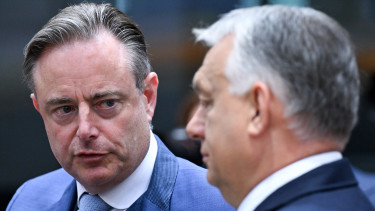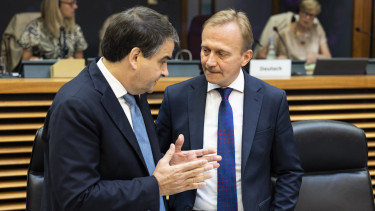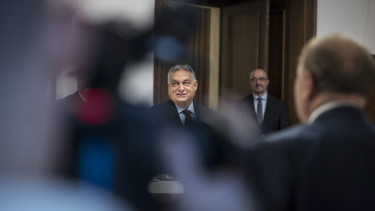The 7 years’ old rescue fund of the euro – which way to go?
Klaus Regling, who participated already in the preparation of the Economic and Monetary Union (thus, the euro), having worked in the German Ministry of Finance and got to the helm of the ESM based on this experience, explained first why the ESM is in Luxembourg: its predecessor, the EFSF (European Financial Stability Facility) had to be created urgently during the 2007-2008 crisis and was therefore set up as a private company under Luxembourg law. The support of Claude Juncker (then president of the „Eurogroup” consisting of the Eurozone countries), the assistance of the EIB, also seated here and the role of Luxembourg as a financial centre were the main factors in choosing the location.
Neither of the two institutions is part of the original institutional setup of the monetary union, as no one imagined such a crisis (a similar one shook the world last time as long ago as in 1929), that a Eurozone country may lose its access to financial markets. Something had to be done then, as the cost of losing the financing would have been immense and the assistance of the IMF was not sufficient. A typical detail: when the crisis struck, it was still thought that handling it will be easy, therefore the original organigram has foreseen 12 people, and the first disbursement, for Ireland, was done the winter of 2011 by eight people while now the institution has a staff of 175.
The most publicised programme was the Greek rescue package but the story started earlier: the 28th November 2010, with the request of Ireland, who received 67.5 billion euros, of which already 17.7 were contributed by the new fund. Next came Portugal and overall five countries and their banks received a total of 295 billion euros from the EFSF and the ESM.
The ESM itself is a lender of last resort for banks, it is forbidden for it to finance states, for good reasons – emphasised its managing director. It provides loans and not grants, and these loans (like those of the IMF) are bound to conditions, the implementation of an adjustment programme.
Both speakers rated the ESM as a success story. Greece also returned to sustainability by 2018 like all other countries. Portugal arrived for example from a deficit of 10% of GDP to an almost balanced budget. This of course had a price, adjustment was painful, but Greece, for example, saved 13 billion euros, 17% of GDP in interest payments, compared to market rates.
Pierre Gramegna voiced an ambitious view of the future: he said that successes to date can be described in one line while the tasks ahead would fill a page and a half. These are now slowly on their way: it was accepted last year that the ESM will be the “backstop” or safety net for the SRF (Single Resolution Fund). This measure is fiscally neutral, the banks have to pay 55-60 billion euros till 2024, and thus it doesn’t burden the member states. The financial toolbox will also develop: it will be simpler to disburse precautionary loans and the ESM will act as an intermediary for the new Eurobonds but this will come into force only after the national Parliaments of the Eurozone members approve it.
Four further necessary steps were listed, these are under discussion at the moment, as decreasing risks effectively means sharing risks and no one likes that. The finance ministers were surprisingly cooperative, agreed both Regling and Gramegna, but they then have to justify themselves and what they agreed to in their Parliaments, and therefore decisions don’t come easy. Some say that the northern countries do not undertake enough while these say that more cannot be “sold” politically. It also not simple to explain that the assistance is only temporary and has to be paid back.
The four further steps that need to be taken:
- The first proposal is a deposit insurance scheme which is independent of the country of the bank. Justification is that the past programmes would have been cheaper, had this existed then.
- The second is to decrease the stock of non-performing loans and of holdings of the bonds of their own government in the balance sheet of banks.
- The third is a reserve fund for liquidity shortages. There are proposals for this but yet no agreement.
- Finally a macroeconomic intervention fund is needed to develop end approach the economies of the member states – but as fiscal policy is the only one which remained in the hands of the countries, they are reluctant to delegate this and therefore it will not be easy to find a solution. There are several proposals on the table, one is a “rainy day fund”, a fund to be used in difficult times (this is for example supported by Luxembourg), a safety fund to protect the unemployment benefit funds of the countries and others. As there is no crisis every year, there would be no need for an annual budget, it could work like a revolving fund, replenished continuously.
Both speakers were optimistic concerning the perspectives, although it was also said that we would not be even where we are now without the crisis. Then, namely, politicians know that a decision has to be taken, negotiating even at three in the morning, at week-ends, also in rooms without windows – hinted the speakers to their experience. One of the first illustrations in the book, the first “investment” of the fund, the coffee-machine symbolises the work done and decisions taken at night, as they knew – said Klaus Regling – that they will have to work overnight and this is not possible without coffee. Nevertheless, it is better to set up crisis management tools in peaceful times, and they are working on that. In these times decisions are taken slower but they are thought over more carefully. The Eurozone will be anyway more resilient with the planned measures, less vulnerable and this will reinforce also the international role of the euro and this is also seen like that by the markets.
The opinion we heard about the chances of implementation was that discussions turn only around the timing and the concrete steps, but no one says that this will not be implemented once. Discussion about the “backstop” for the SRS were going on for five years according to Mr. Gramegna, but he is convinced that it will be operational by 2021. The most difficult will be to have the macroeconomic stabilisation fund accepted, as a two-thirds majority will be needed (remember that the ESM itself is not one of the EU institutions but an intergovernmental organisation because David Cameron – in spite of the U.K. not being member of the Eurozone – did not agree to it).
We heard, however, also about the pitfalls: asking for assistance of the fund means a stigma, like turning to the IMF is, and this prejudice has to be defeated – the IMF solution was successfully used by Mexico, Columbia and also Poland.
As the ESM is closer to its debtors than the IMF, this may be a smaller problem. On the other side, however, this closeness also entails a „moral hazard” as the existence of this safety net may encourage less responsible behaviour. This has to be taken into account in the decisions – and there is a difference also whether the affairs of the country itself are in order or its budget is also in trouble.
As a reason for optimism it was mentioned that there were also sceptics when the Eurozone itself was created, predicting that it will fail without the harmonisation of macroeconomic policy – these opinions were right in theory but the general opinion then was (and of course political resistance also played a role) that without first acquiring an experience on how the currency union works, this harmonisation cannot be done. The fall of the Berlin wall was also a historic occasion to reinforce European unity and the risks didn’t seem to be significant at the start. Another argument: we could read for the one-two years while the banking union was negotiated, that it will be difficult, there is never going to be an agreement while after the agreement it was said that it will never be implemented. This also proved wrong.
I still asked Klaus Regling after the end of the session whether he doesn’t feel that the tone of the whole discussion was too optimistic. He denied it and pointed again to the fact that before having created the Eurozone and also the ESM he was thought to be over-optimistic, but he has proven right. On the question what the resistance of Poland and Hungary means in this respect, he just said that according to him, these two countries will also join sooner or later.
László S. Szabó
On the cover photo: Klaus Regling. Source Dario Pignatelli/Bloomberg via Getty Images
















